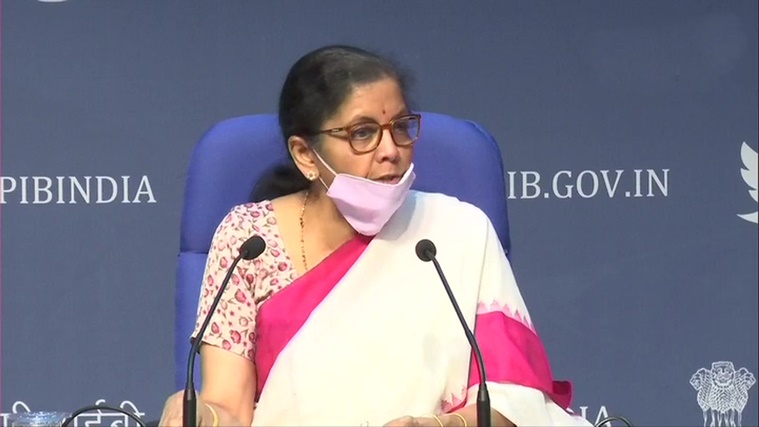
SOURCE: ENS
Three defence workers’ unions – affiliated to Rashtriya Swayamsevak Sangh (RSS), Congress and the Left – came together on Saturday to oppose Finance Minister Nirmala Sitharaman’s announcements of corporatisation of Ordnance Factory Board (OFB) and increased Foreign Direct Investment (FDI) in the Defence manufacturing as part of the fourth chapter of Atmanirbhar Bharat initiative.
Sitharaman’s announcement for self-reliance in defence production included corporatisation of OFB for improving autonomy, accountability and efficiency in ordnance suppliers and FDI limit in defence manufacturing under automatic route to be raised from 49 per cent to 74 per cent.
The corporatisation of the OFB – which is an umbrella organisation for the 41 ordnance factories and their ecosystem – has been under consideration since the beginning of the second term of the Narendra Modi government. The decisions were opposed jointly by the Bhartiya Pratiraksha Mazdoor Sangh (BPMS), an arm of Bhartiya Mazdoor Sangh (BMS) affiliated to the RSS; All India Defence Employees’ Federation (AIDEF), affiliated to Centre of Indian Trade Unions (CITU) of the Communist Party of India; and Indian National Defence Workers’ Federation (INDWF), affiliated to Indian National Trade Union Congress (INTUC) of the Indian National Congress.
Mukesh Singh, general secretary of BPMS, said, “We condemn and oppose these decisions of the government that have been taken unilaterally without consulting the federation, which was assured from time to time by all authorities including the Defence Minister. This act of the government at the time when the nation is engaged in fighting the Covid-19 pandemic, not only amounts to dishonouring the commitment, but also establishes the arrogance of the administration and a derailment of the democratic process. BPMS calls upon the government to immediately roll back its decision, failing which it will launch a nationwide agitation, which will be at the risk and cost of the government. Under no circumstances shall BPMS tolerate such unilateral, unjust and bad decisions of the government.”
Speaking to The Indian Express, R Srinivasan, INDWF general secretary, said, “This decision shows complete disregard to the process of consulting with the stakeholders. What happened to the commitment made at the highest level? Also, is this the time to take such a decision that affects the national security? The three main unions are coming together in opposing this unilateral decision by the government and will issue a joint statement tomorrow. We together represent over 80 to 85 per cent of the total 82,000 strong workforce from ordnance factories and also the employees of the base workshops.”
The unions have also criticised the announcement of ‘convergence between Defence Sector and Civil Aircraft Maintenance, Repair and Overhaul (MRO)’ saying it indicates “privatisation of Base Repair Depots of the Indian Air Force”. BPMS has objected to the step, saying, “Base Repair Depots play a crucial role in maintaining the hardware of the forces and many ‘trade secrets’ are being kept in the process. Opening up these important sectors to private parties is a cause of concern as there are chances of jeopardising the national interest.”
AIDEF General Secretary C Srikumar said, “This was announced in the most cowardly manner when the workers and trade union leaders are in isolation at their home due to the lockdown and it reminds us the emergency like situation. After the announcement, the issue was discussed by general secretaries of INDWF and BPMS and it was unitedly decided that we should jointly fight back against this atrocious and authoritarian decision of the government.”
What does corporatisation of the OFB mean?
Corporatisation of Ordnance factories was listed as one of the 167 ‘transformative ideas’ to be implemented in the first 100 days of the Narendra Modi government’s second term. Currently, the OFB, which is over 200 years’ old institution, functions as a government department under the Ministry of Defence. The plan is to convert it into one or more corporate entities fully owned by the government in the same way as that of the other public sector units (PSUs).
The ‘for’ argument has been that the corporatisation would improve the efficiency of the ordnance factories, make their products cost competitive and result in quality enhancements.
On the other hand, employees fear corporatisation is only a first step towards privatisation. They also fear job losses. But their key argument is that a corporate entity would not be able to survive the unique market environment of defence products that has very unstable demand and supply dynamics. Unions have maintained that converting the Ordnance factories into a corporation is not commercially viable because of fluctuations in orders, long gaps between orders, uneconomical order quantity, and life cycle support required for 30-40 years after introduction of equipment.
https://defencenewsofindia.com/defence-worker-unions-oppose-corporatisation-of-ofb-increased-fdi-in-manufacturing/






